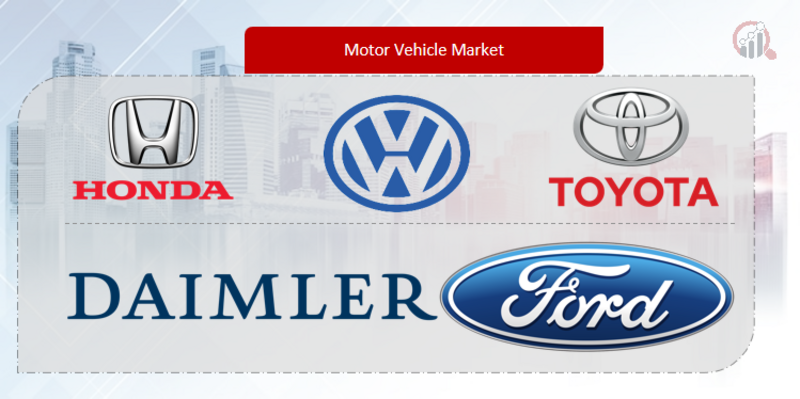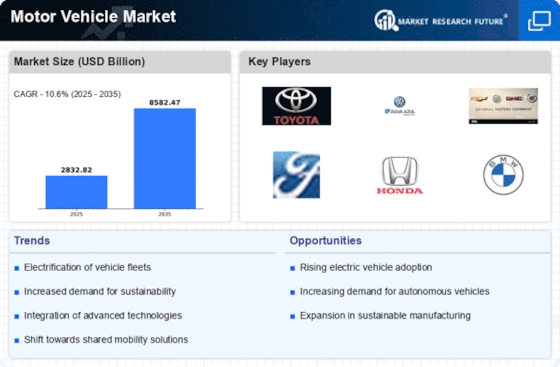Top Industry Leaders in the Motor Vehicle Market

*Disclaimer: List of key companies in no particular order
Top listed global companies in the Motor Vehicle industry:
Volkswagen AG
Toyota Motor Corp
Daimler AG
Ford Motor Co
Honda Motor Co Ltd.
Fiat Chrysler Automobiles NV
SAIC Motor Co Ltd.
EXOR Group
Bayerische Motoren Werke AG
Hyundai Motor Co Ltd.
Bridging the Gap by Exploring the Competitive Landscape of the Motor Vehicle Top Players
The motor vehicle market is a global behemoth, constantly evolving as consumer preferences, technological advancements, and economic factors shift the landscape. Understanding the competitive dynamics of this industry is crucial for both established players and aspiring entrants.
Key Player Strategies:
Traditional giants (Toyota, Volkswagen, General Motors) are leveraging their economies of scale and brand recognition to maintain dominance. They invest heavily in R&D, expand into emerging markets, and optimize production processes to maintain cost efficiency.
Luxury carmakers (BMW, Mercedes-Benz, Audi) are focusing on exclusivity and innovation to differentiate themselves. They offer personalized experiences, cutting-edge technology, and high-performance vehicles to cater to a premium clientele.
New entrants (Tesla, Rivian, Lucid) are disrupting the market with electric vehicles (EVs). They prioritize sustainability, cutting-edge technology, and direct-to-consumer sales models to gain traction among environmentally conscious consumers.
Asian manufacturers (Hyundai, Kia, Honda) are capturing market share with competitive pricing and feature-rich vehicles. They cater to budget-conscious buyers and offer diverse model options to appeal to a broad audience.
Factors for Market Share Analysis:
Vehicle type (sedans, SUVs, trucks, EVs) and price segment (economy, mid-range, luxury) are key indicators of market share distribution. Different segments cater to diverse customer needs and price points.
Sales volume, revenue, and brand value are crucial metrics for assessing a company's market position. Monitoring these metrics over time provides insights into a company's performance and growth trajectory.
Geographic reach and market penetration in key regions (North America, Europe, Asia) are essential factors for global players. Understanding regional preferences and regulations is crucial for successful expansion.
New and Emerging Trends:
The rise of EVs is reshaping the industry, with major investments in battery technology, charging infrastructure, and autonomous driving capabilities. This trend presents both opportunities and challenges for traditional and new players.
Connectivity and digitalization are transforming the driving experience, with features like advanced driver-assistance systems (ADAS), infotainment systems, and over-the-air (OTA) updates gaining prominence. This trend requires significant investments in software development and data security.
Shared mobility models, such as car-sharing and ride-hailing services, are impacting car ownership patterns, particularly in urban areas. This trend necessitates adjustments in traditional sales and distribution models for manufacturers.
Overall Competitive Scenario:
The motor vehicle market is fiercely competitive, with established players facing increasing pressure from new entrants and disruptive technologies. Companies must adapt their strategies to cater to evolving customer preferences, embrace innovation, and navigate the challenges of the changing landscape. Success will depend on a combination of factors, including brand strength, technological prowess, cost efficiency, and agility to adapt to new trends.
In conclusion, the competitive landscape of the motor vehicle market is a dynamic and complex one. Understanding the key player strategies, market share factors, and emerging trends is crucial for navigating this challenging terrain. By adapting to the changing environment and embracing innovation, companies can secure their position in this ever-evolving industry.
Latest Company Updates:
Volkswagen AG:
- Date: Jan 17, 2024 (Source: Volkswagen press release)
- Development: Unveiled ID.Buzz concept camper van, showcasing potential for leisure-oriented EVs.
Daimler AG:
- Date: Jan 12, 2024 (Source: Daimler press release)
- Development: Announced partnership with NVIDIA for software development in future Mercedes-Benz vehicles.
Ford Motor Co:
- Date: Jan 10, 2024 (Source: Ford press release)
- Development: Increased production of F-150 Lightning electric pickup truck due to high demand.
Honda Motor Co Ltd.:
- Date: Jan 5, 2024 (Source: Honda website)
- Development: Unveiled Prologue electric SUV concept, hinting at future design direction for Honda EVs.










